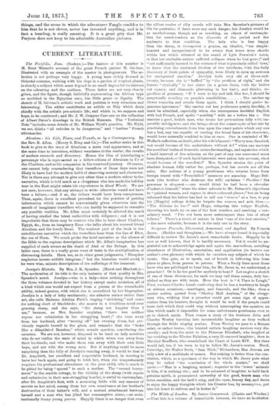Scripture Proverbs, Illustrated, Annotated, and Applied. By Francis Jacox. (Hodder
and Stoughton.)—We have always found it especially difficult to review Mr. Jacox's most remarkable books. Happily he is now so well known, that it is hardly necessary. Yet it would be un- grateful not to acknowledge again and again the marvellous, unfailing abundance of illustration, annotation, and application (to borrow our author's own phrases) with which be enriches any subject of which he treats. One gets, so to speak, out of breath in following him from place to place, from person to person. What a lively time must those have who are privileged to hear him, for Mr. Jacox is, we understand, a preacher ! Or is he too good for anybody to hear ? Let us give a sketch of one of these discourses, for such we may call these essays, duly fur- nished as they are with texts. Here the text is "A Time to Laugh." First, we have Charles Lamb confessing that he has a tendency to laugh on solemn occasions,—marriages, and funerals, and the like; then a quaint notion, quoted from "Shirley Hall Asylum," of the clergy- man who, wishing that a preacher could got some sign of appre- ciation from his hearers, thought it would be well if the people could have tails which they could wag without interrupting the speaker, an idea which made it impossible for some unfortunate gentleman ever to go to church again. Then comes a story of the brothers John and Charles Wesley bursting into incontrolable laughter as they walked through the fields singing psalms. From Wesley we pass to a Roman saint, or rather !mattes, who treated certain laughing novices very dis- creetly ; and from the saint to the Princess Elizabeth, who laughed at her wedding to the Elector Palatine, a very ill-omened laughter ; then to Marshal Boners, who scandalised the Court of Louis XIV. But time would fail, too, if we were to try to follow Mr. Jacox's enures. Hood, Coleridge, Sir Walter Scott, "Sam Slick," Richardson, Bon Jenson are only a few of a multitude of names. But nothing is better than the con- clusion, which, as a specimen of the way in which Mr. Jacox puts what may be called "the conclusion of the whole matter," we shall quote:—" Man is a laughing animal ; superior to the 'lower' animals in this, if in nothing else; and to be ashamed of laughter, to hold back genuine mirth, is pronounced unworthy of the good, brava man who loves sunshine, and the lark's song, and the open, breezy flow, and dares to enjoy the happy thoughts which his Creator has, by assumption, put into his heart to enliven and to better it."


































 Previous page
Previous page